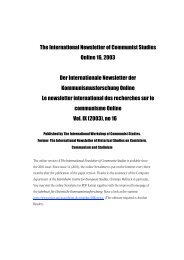VOL. XVI (2010), NO 23 - The International Newsletter of Communist ...
VOL. XVI (2010), NO 23 - The International Newsletter of Communist ...
VOL. XVI (2010), NO 23 - The International Newsletter of Communist ...
Sie wollen auch ein ePaper? Erhöhen Sie die Reichweite Ihrer Titel.
YUMPU macht aus Druck-PDFs automatisch weboptimierte ePaper, die Google liebt.
<strong>The</strong> <strong>International</strong> <strong>Newsletter</strong> <strong>of</strong> <strong>Communist</strong> Studies Online <strong>XVI</strong> (<strong>2010</strong>), no. <strong>23</strong> 84<br />
bureau should have delegates from Spain, Holland, Italy, France, Great Britain and Latin<br />
America “so that the mutuality <strong>of</strong> information may be real”. Meanwhile, Borodin himself took<br />
part in the work <strong>of</strong> this institution without any mandate given by the ECCI, but he hoped “that<br />
the comrades in Russia will approve <strong>of</strong> it” and was sure that such a bureau would be <strong>of</strong> great<br />
benefit for all who would participate in it. He deemed its work necessary since the Bureau <strong>of</strong><br />
the Third <strong>International</strong> in Moscow was not in the position to keep in constant touch with many<br />
countries. 19 For the moment, the creation <strong>of</strong> the bureau appeared to Borodin more important<br />
and significant than the foundation <strong>of</strong> a few <strong>Communist</strong> Parties. Such a structure would be a<br />
channel <strong>of</strong> providing Moscow with information about different countries and, at the same<br />
time, it would become (together with the Latin American Bureau <strong>of</strong> the 3 rd <strong>International</strong>) a<br />
connecting chain between the communists <strong>of</strong> the Western and Eastern Hemispheres and,<br />
possibly, the coordination center for the left wingers in various regions.<br />
Thus, the answer given by the Soviet emissary to some left wingers during a conversation in<br />
Madrid should not be surprising. Some time after the PSOE congress (which took place in<br />
Madrid in November 7 to 14, 1921) was over, 20 young Spanish socialists told Borodin that if<br />
he had arrived before the congress, the delegates would have voted for the Third<br />
<strong>International</strong> by an overwhelming majority. 21 But the first words <strong>of</strong> Borodin must have<br />
shocked his Spanish vis-à-vis: “I am glad that I came too late”. 22 He explained his attitude in<br />
the following simple words: if the congress had affiliated the PSOE with Moscow, the<br />
Comintern would receive “another opportunist party” which did not realize “the meaning <strong>of</strong><br />
the proletarian revolution” and would be full <strong>of</strong> “undesirable” elements. Borodin did not<br />
believe in the probability <strong>of</strong> the conquest <strong>of</strong> the party machinery and apparatus by the left<br />
wingers, moreover, he was sure that such a victory would pose a real threat to the Comintern<br />
as the PSOE machinery was “saturated with reformism, social patriotism, temporizing, and<br />
so forth” and all these sicknesses would destroy the World <strong>Communist</strong> Party as it had<br />
happened before with the Second <strong>International</strong>. <strong>23</strong><br />
Instructions received by Phillips from Borodin fully coincided with this attitude: the crucial<br />
point <strong>of</strong> them was to work among the young socialist militants who accepted cordially the<br />
Comintern envoy. 24 <strong>The</strong> goal was clear and precise: to split the Socialist Party and to create<br />
a party which would be entirely loyal to the Comintern although less numerous than the<br />
PSOE. <strong>The</strong> result was finally achieved, and after the left wing splitted from the Socialist Party<br />
in 1921, the Partido Comunista de España (PCE) was founded, also supported by some<br />
anarcho-syndicalist groups. 25 <strong>The</strong> conversations <strong>of</strong> Spanish militants with Borodin and<br />
Phillips turned out to be fruitful. <strong>The</strong> young Mexican-American communists followed the<br />
general outline already used in Mexico: the alliance with young and vigorous supporters <strong>of</strong><br />
the 3 rd <strong>International</strong> and the formation <strong>of</strong> a revolutionary left wing nucleus which would join<br />
the Comintern without applying for a special status.<br />
19 Ibid., l. 3.<br />
20 Congreso Extraordinario del PSOE, 1921. Nacimiento del Partido Comunista Español, Bilbao, Zero, 1974, p. 33;<br />
<strong>The</strong> document <strong>of</strong> fusion <strong>of</strong> the PArtido Comunista Espanol and the Partido Comunista Obrero de Espana, signed by<br />
in the name <strong>of</strong> the Executive Commite <strong>of</strong> the 3 rd <strong>International</strong>, Antonio Grazia Dei, has been published in Bahne,<br />
Op. cit., pp. 92-97.<br />
21 RGASPI, 497/2/7, 59.<br />
22 Ibid.<br />
<strong>23</strong> Ibid.<br />
24 Gomez, Op. cit., p. 41.<br />
25 G.V.: Kompartiia Ispanii. In: D. Petrovskii (ed.): Partii Kommunisticheskogo Internatsionala. Spravochnik<br />
propagandista, Moskva-Leningrad, Gosizdat, 1928, p. 65.














